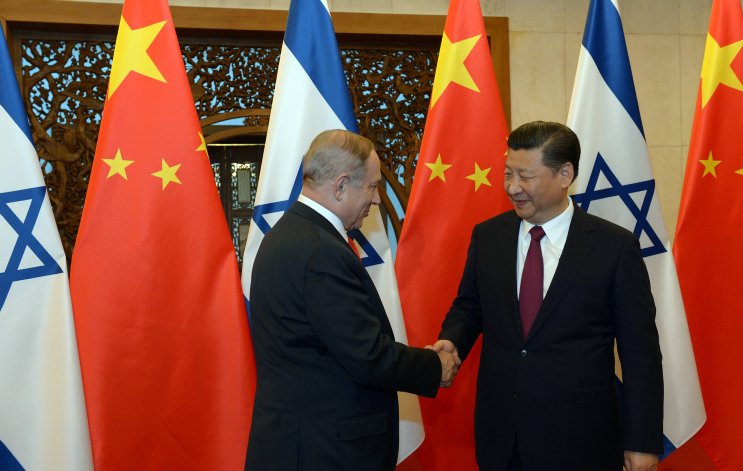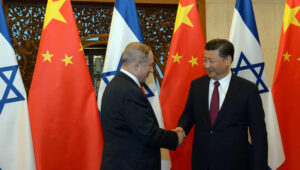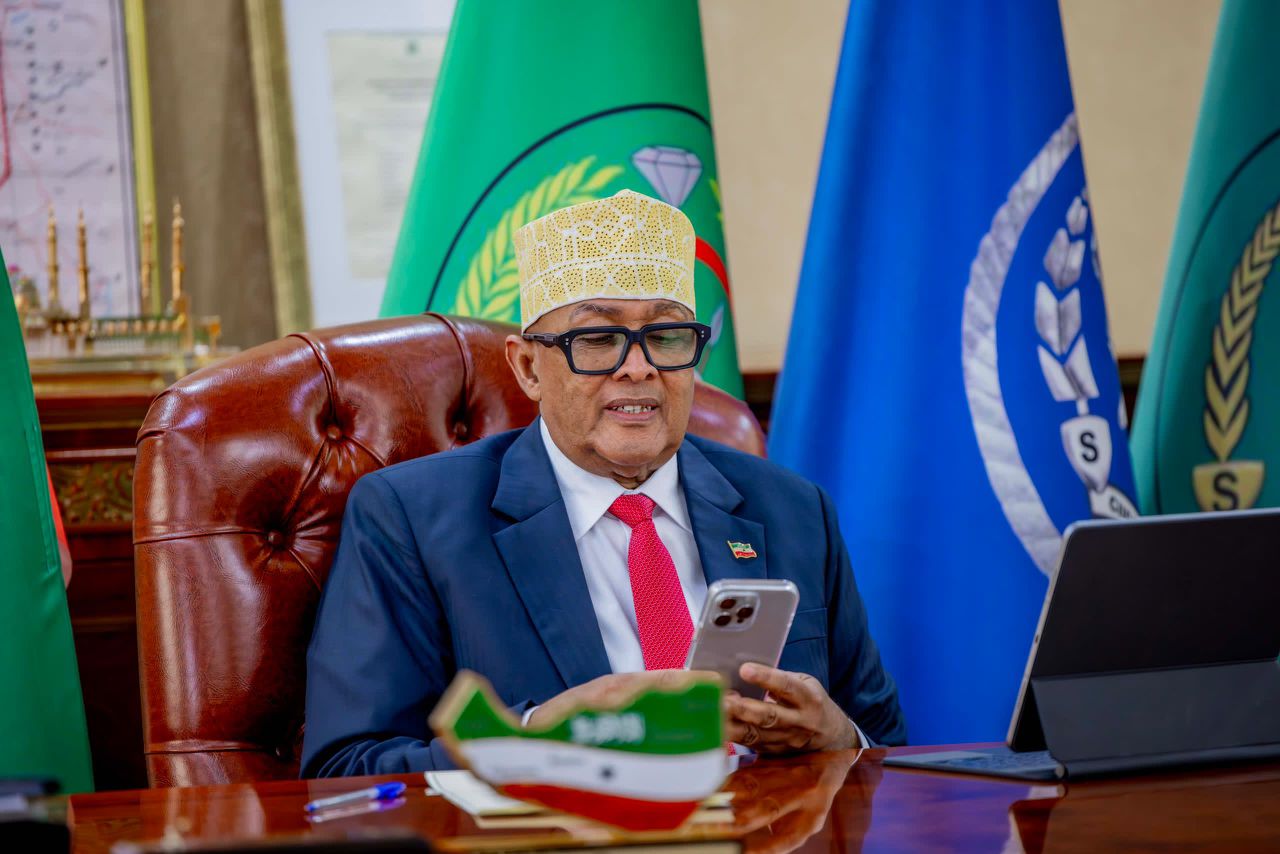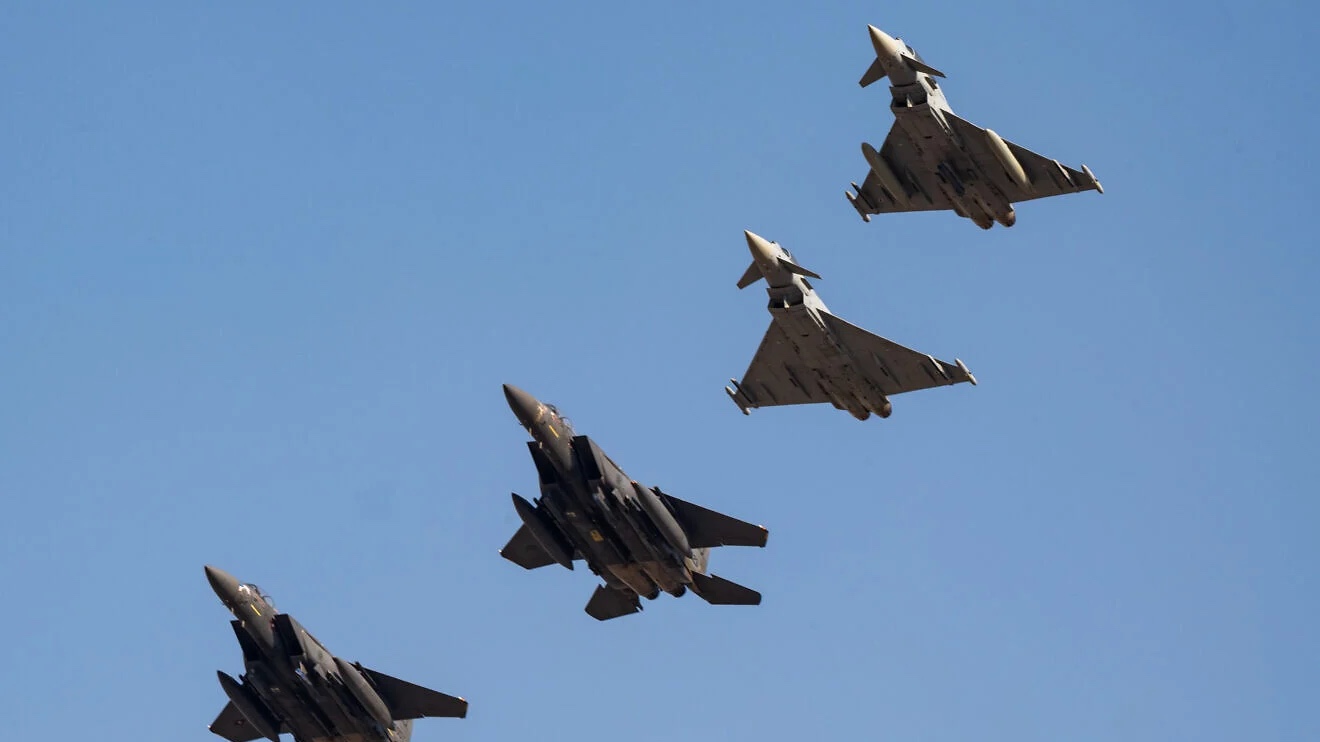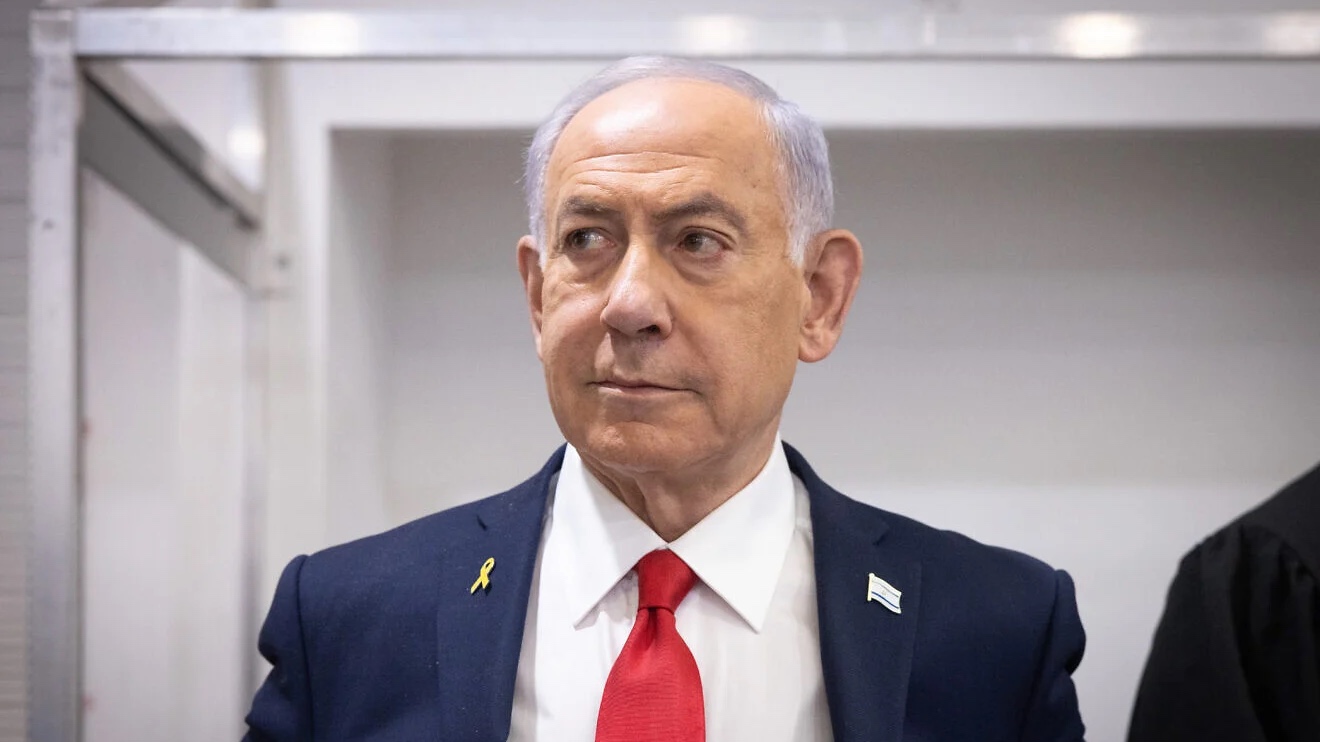(JNS) For much of the past two decades, Israel treated China as a valuable but distant partner, a source of investment, technology cooperation and access to Asian markets. The relationship was pragmatic and carefully managed: Israel avoided open alignment with Washington’s criticism of Beijing, while China maintained a policy of formal neutrality in Middle Eastern conflicts.
Bilateral trade grew steadily, Chinese companies built infrastructure across Israel, and diplomatic exchanges remained cordial, if cautious.
That equilibrium collapsed after the Oct. 7, 2023, Hamas attack and the war that followed.
China’s leadership has since positioned itself as a shadow adversary of Israel, leading international criticism of IDF actions, blocking UN resolutions condemning Hamas, and repeating accusations of “collective punishment” and “violations of international law.”
Foreign Minister Wang Yi’s Oct. 14, 2023, declaration that Israel had gone “beyond the scope of self-defense” set the tone for Beijing’s messaging, echoed by state media outlets that have framed Israel as the aggressor and elevated pro-Palestinian narratives.
Chinese opposition to Israel
If Israel’s relationship with China once relied on quiet pragmatism, the information front that has emerged since Oct. 7 reflects open hostility. Beijing has used its global media reach and control of digital platforms to shape international perception of the Gaza war, amplifying anti-Israel narratives while promoting its own image as a defender of the Global South.
On social media, the shift has been unmistakable. Since the war began, TikTok has been flooded with anti-Israel content.
“In China, there was a really clear push by the government through its censorship control, enforcing an anti-Israel mindset. All social and traditional media received non-stop images from Gaza to turn the public opinion against Israel,” Carice Witte, the founder and executive director of SIGNAL Group, told JNS. “Social media under Chinese control in other countries has likely also been shaped to produce a similar effect,” she added.
Furthermore, at home on Chinese platforms such as Weibo and Douyin, state-linked accounts have circulated conspiratorial tropes about “Jewish financial power” and “hidden influence,” echoing Soviet-era antisemitism repackaged as anti-colonial critique.
Approval and support
Galia Lavi, deputy director of the Diane and Guilford Glazer Israel-China Policy Center at the Institute for National Security Studies (INSS) at Tel Aviv University, explained that Beijing’s well-established capacity to censor internal content indicates approval and support.
“This does not appear to be a centrally directed effort by the Chinese government, but rather a case of tolerance and inaction. At best, Beijing is turning a blind eye, despite its well-known ability to control and censor online content within China,” Lavi told JNS. “At worst, there have been instances of implicit cooperation, when official Chinese accounts or diplomats have shared antisemitic or anti-Israeli content on social media platforms,” she added.
As Beijing sharpened its information offensive, it also reinforced its partnership with Tehran, becoming Iran’s main economic lifeline and a key diplomatic shield.
The foundation of that relationship is the 2021 China–Iran 25-year cooperation pact, a sweeping agreement that formalized long-term investment and energy commitments.
At its signing, Foreign Minister Wang declared, “Our relations with Iran will not be affected by the current situation, but will be permanent and strategic.”
Under the framework, Beijing pledged hundreds of billions of dollars in infrastructure and technology investments in exchange for preferential access to Iranian crude. The pact has since allowed Iran to bypass international isolation and maintain steady oil revenue despite global sanctions.
China is now by far Iran’s largest customer for crude oil, effectively keeping Tehran’s energy sector alive. By 2023, Beijing was purchasing about 91% of Iran’s oil exports, channeling billions of dollars into its sanctions-strapped economy. Much of this trade is concealed through relabeling and intermediary routes that obscure the oil’s Iranian origin.
This economic relationship has also taken on a military dimension. During the June 2025 Israel–Iran war, Beijing condemned Israeli strikes and urged “restraint,” but reports indicate that China quietly accelerated its support for Tehran afterward. Western intelligence assessments and defense analyses suggest that China supplied Iran with HQ-9B surface-to-air missiles, as well as missile production components, dual-use electronics, and guidance systems necessary to rebuild facilities damaged by Israeli airstrikes.
Jerusalem ‘cannot accept’
Israeli Ambassador to the US Yechiel Leiter recently warned of “troubling signs” of Chinese support for Iran, emphasizing that while Jerusalem “wants good relations with the Chinese people,” it “cannot accept Beijing working hand-in-hand with a regime that openly threatens our destruction.”
China’s material backing for Iran extends beyond direct trade and defense cooperation, reaching into the proxy networks that Tehran relies on across the region. Israeli forces have uncovered Chinese-manufactured rifles, machine guns and anti-tank weapons in Gaza, with evidence suggesting that the equipment arrived through Iranian smuggling channels.
Procurement routes in China and Hong Kong have also supplied precision components for Iranian drones, the same UAVs used by Hezbollah in the north and by the Houthis in the Red Sea.
In Yemen, US intelligence has identified a supply network operating inside China since 2024 that provides guidance chips and propulsion systems for Houthi ballistic and cruise missiles.
According to an i24 NEWS report, the Iran-backed group uses Chinese-made weapons in its attacks. The Houthis plan to manufacture hundreds of missiles using Chinese components, it added. Washington has passed detailed lists of the Chinese companies involved to Beijing, warning that the network poses a regional threat.
The United States has meanwhile blacklisted 15 Chinese companies for supplying electronic components used by Hamas and the Houthis. The designations cite firms that “facilitated the purchase and procurement of these electronic components” used in Iranian-made drones deployed by both groups.
Separate Treasury actions in April 2025 targeted additional Chinese entities for exporting propellant materials and guidance technology used in Iran’s missile production. Defense assessments have linked Chinese-origin parts to systems such as Shahab-3 medium range ballistic missiles and Fatah-110 tactical short-range ballistic missiles, while 800 Chinese-made drone propellers were seized en route to Yemen.
US officials say the network of suppliers in mainland China, often operating through front companies, has become a key source of dual-use technology feeding Iran’s proxy arsenal.
Lavi pointed out that while Chinese components are certainly showing up in Iranian proxy weapons, this does not necessarily reflect government policy.
“China is not deliberately or massively supporting Iran and its proxies. Instead, what we see is a pattern of tacit tolerance, a willingness to turn a blind eye to Chinese actors, including private companies, criminal agents and intermediaries, which supply equipment or intelligence to terrorist organizations in exchange for money or other benefits,” Lavi said.
“While these actions may not reflect an official state policy, Beijing has not done enough to curb them,” she added.
China’s motivation
Beijing’s hostility toward Israel is rooted in strategy rather than emotion.
The Middle East remains indispensable to Beijing’s economic and energy security, supplying more than half of China’s imported crude oil.
“China views the Middle East primarily as an economic opportunity—a region vital for energy security, infrastructure projects and market expansion,” Lavi said.
Iran and Gulf producers such as Saudi Arabia and the United Arab Emirates remain major trade partners under Beijing’s Belt and Road Initiative.
Furthermore, Chinese infrastructure projects in Arab Middle Eastern countries serve as a critical highway to support other Chinese initiatives in Africa. In this respect, placating anti-Israel regimes through criticism of the Jewish state and support for the Palestinian cause is a calculated economic investment.
At the same time, China’s growing confrontation with the United States has transformed the Middle East into a secondary theater of competition.
“In recent years, Beijing has sought to elevate its political role, presenting itself as a potential mediator in regional conflicts and a counterweight to US influence,” Lavi said.
Witte added to this assessment, saying, “China sees Israel as a tool for achieving certain geopolitical goals. First and foremost is differentiating itself from the United States. If the US stands with Israel, then China automatically takes the opposite position,” she explained.
Beijing’s outreach to Tehran and its vocal criticism of Israel serve to undermine the US alliance network and cast Washington as a destabilizing force. When the Swords of Iron war and later the Israel–Iran conflict prompted renewed US deployments, China swiftly shifted its narrative, from claiming America was “withdrawing” from the Middle East to accusing it of “over-involvement.”
Keeping the focus on the Middle East, leading to increased involvement of US forces, also provides a secondary geopolitical benefit for China as those troops remain tied down securing oil routes vital to its economy, while Washington’s attention to East Asia diminishes.
“Its limited enforcement efforts suggest a degree of strategic convenience: A low-intensity conflict in the Middle East serves China’s broader interest,” Lavi said.
“It allows Beijing to portray itself as a neutral power and a diplomatic alternative to the United States, while benefiting economically and politically from regional instability that weakens Western influence without drawing China into direct confrontation,” she added.
Finally, Beijing’s ideological positioning as the leader of the Global South gives its anti-Israel posture additional significance. By adopting the language of “anti-colonial resistance” and presenting itself as the defender of the oppressed, China strengthens its image among Arab, African and Latin American states. Foreign Minister Wang has repeatedly cast China as a moral counterweight to the West.
Performative criticism
Wesley Hill, assistant director at the Energy, Growth and Security Program at the International Tax and Investment Center in Washington, DC, noted that “China portrays itself as a responsible alternative to the United States, and the unpopularity of Israel amongst many nations in the Global South means that even performative criticism increases its reach.”
Through this positioning, Beijing has turned Israel’s war into an opportunity to expand its diplomatic influence and reshape global opinion in its favor.
Witte further explained that China’s use of globalist institutions serves as a further incentive to oppose Israel.
“China’s role as the leader of the Global South gives it an advantage in international forums like the United Nations because of its ties with the majority of countries. This dynamic helps it drive forward its various global initiatives,” Witte said. “In that sense, Israel’s role as an antagonist in the UN sets up as a natural target for China,” she added.
Lavi pointed out that despite China’s shadow role as a major supporter of the anti-Israel coalition, the superpower’s track record throughout the war has shown it to be incapable of challenging US hegemony in the region.
“The October 7 massacre and the ensuing war, along with the Houthi disruptions in the Red Sea, have revealed the limits of China’s real influence.
Despite its growing presence, Beijing has shown that it is either unwilling or unable to leverage its power to shape outcomes in the region, even when its own economic interests are at risk,” Lavi said.
Lavi went on to point out that with the election of Donald Trump, Chinese influence in the Middle East has significantly diminished as the president has reinvigorated and solidified US alliances across the region.
“China seems to prefer short-term economic losses in exchange for leveraging its political position compared to the US. Yet this effort has largely failed to yield meaningful diplomatic gains,” Lavi observed. “In practice, China has proven irrelevant to the region’s key developments, as is evident now, when nearly all major actors have aligned themselves with President Trump’s recent ceasefire initiative,” she said.
Witte added that in recent months, China’s relations with Jerusalem have gradually been improving due to Israel’s military success.
“Israel’s role as the military and intelligence leader in the Middle East meant that China had a distinct interest in retaining relations. However, after October 7, China decided that Israel was no longer a military superpower and therefore lost its incentive for keeping close relations,” Witte said.
“After Israel had its massive military and intelligence successes surrounding the campaigns in Lebanon and Iran, China changed its tone, realizing that it perhaps overinterpreted the importance of October 7,” she said.
Want more news from Israel?
Click Here to sign up for our FREE daily email updates


